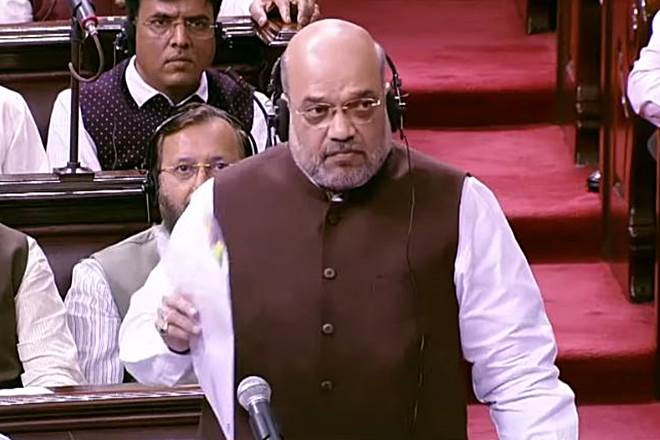The past few days have witnessed extensive coverage of the crucial developments concerning the state of Jammu & Kashmir. In a historic reform, a Presidential Order has rendered Article 370 ineffective and the Jammu and Kashmir Reorganisation Bill, 2019 introduced by Amit Shah in Rajya Sabha has been passed by the Parliament which bifurcates the state of Jammu and Kashmir into two Union Territories- Ladakh (without legislature) and Jammu & Kashmir (with legislature). Yesterday, the Lok Sabha passed the motion abrogating Article 370 and also voted in favour of the Reorganisation Bill. After Presidential Assent, the Jammu & Kashmir Reorganisation Bill will become an Act of the Parliament and the state will be bifurcated in accordance with the Reorganisation Bill.
What many political analysts and commentators have failed to appreciate is the fact that Home Minister Amit Shah introduced the Bill in Rajya Sabha instead of the Lok Sabha. This is not merely a coincidental or symbolic. Rather, it seems that the Modi government had a well-thought out strategy behind this. Firstly, it was about giving a loud and clear message. It appears that Amit Shah and the Modi government wanted to make it clear that this Bill was not just about numbers but it was about keeping national interest paramount. The BJP is not in majority in Rajya Sabha. However, by introducing the Bill in Rajya Sabha, the BJP made it clear that it was not bothered about the numbers game. Where national interest is involved, it was more than just a legitimate expectation that other parties will also come around in support of the resolution to abrogate Article 370 and the bifurcation bill. And this move seems to have worked as it put members of all parties in the Rajya Sabha and their commitment to India’s national interests to test. When the whole country was watching closely, parties like the BJD, BSP, AAP, YSRCP, TDP and AIADMK came out in support of the resolution scrapping Article 370 and the Bifurcation Bill. Out of these parties, only AIADMK is a part of the BJP led NDA. The manner in which several opposition parties came in support of the Modi government’s move made it amply clear that Amit Shah chose to introduce the Jammu and Kashmir Reorganisation Bill and the resolution scrapping Article 370 and 35A in national interest, which is above any numbers game.
Secondly, the BJP made a pragmatic decision by not falling prey to the temptation of introducing the Jammu and Kashmir Reorganisation Bill and the Resolution in the Lok Sabha, where the ruling party has an absolute majority, before Rajya Sabha. Getting the Bill passed in Lok Sabha was a cakewalk for the Modi government. However, if there was scope of any deadlock, it was in the Rajya Sabha. If the Union Home Minister, Amit Shah, had introduced the Bill in Lok Sabha, it would have given a chance to the Opposition to rally around and stall the Bill in Rajya Sabha, where the opposition still holds some sway. By introducing the Bill in Rajya Sabha, Amit Shah sprung a surprise for the Opposition parties. The opposition did not really get a chance of rallying around and closing ranks in the Rajya Sabha. Some parties came in support in the heat of the moment, as the entire nation watched, instead of indulging in political manipulations and the Bill was passed. This explains clearly why Amit Shah may have chosen the Rajya Sabha to introduce the Jammu and Kashmir Reorganisation Bill and the Resolution scrapping Article 370, all which were incredibly sensitive and major decisions but which passed rather seemlessly with the support of several regional parties.
